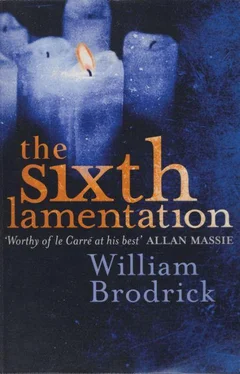William Brodrick - The Sixth Lamentation
Здесь есть возможность читать онлайн «William Brodrick - The Sixth Lamentation» весь текст электронной книги совершенно бесплатно (целиком полную версию без сокращений). В некоторых случаях можно слушать аудио, скачать через торрент в формате fb2 и присутствует краткое содержание. Жанр: Триллер, на английском языке. Описание произведения, (предисловие) а так же отзывы посетителей доступны на портале библиотеки ЛибКат.
- Название:The Sixth Lamentation
- Автор:
- Жанр:
- Год:неизвестен
- ISBN:нет данных
- Рейтинг книги:5 / 5. Голосов: 1
-
Избранное:Добавить в избранное
- Отзывы:
-
Ваша оценка:
- 100
- 1
- 2
- 3
- 4
- 5
The Sixth Lamentation: краткое содержание, описание и аннотация
Предлагаем к чтению аннотацию, описание, краткое содержание или предисловие (зависит от того, что написал сам автор книги «The Sixth Lamentation»). Если вы не нашли необходимую информацию о книге — напишите в комментариях, мы постараемся отыскать её.
The Sixth Lamentation — читать онлайн бесплатно полную книгу (весь текст) целиком
Ниже представлен текст книги, разбитый по страницам. Система сохранения места последней прочитанной страницы, позволяет с удобством читать онлайн бесплатно книгу «The Sixth Lamentation», без необходимости каждый раз заново искать на чём Вы остановились. Поставьте закладку, и сможете в любой момент перейти на страницу, на которой закончили чтение.
Интервал:
Закладка:
‘So who was it that dared to take the place of God and give that man across the lake a new name, a new life?’
The two men faced each other. A sensation of rapid foreshortening brought the gentle gaze of Salomon Lachaise unbearably close to Anselm’s secret. They sat as friends: one of them waiting patiently for judgement, the other, Anselm, engaged in an enterprise that might absolve the need for a trial — hope and its adversary at one table.
‘That’s another good point.’ They were the only words Anselm could assemble that did not require him to lie.
Salomon Lachaise reviewed the state of play upon the board and, with a look of quiet amusement, toppled his king. ‘Anselm of Canterbury, I resign.’
Chapter Twenty
1
It was a sensible arrangement. At the back of the flat were two bedrooms, side by side, one of which had French windows opening out on to the garden. That was where Agnes slept. The other was for Wilma. They left their doors ajar at night.
Lucy was staggered at Wilma’s cleanliness. For fifteen years she’d bustled from Hammersmith to Shepherd’s Bush, to a drop-in centre by a church. There she showered, took her breakfast and then came back to feed the birds in Ravenscourt Park. She’d met Agnes while tailing a pigeon. A friendship had grown, unknown to anyone in the family including Lucy. It was always that way with Agnes. She had small, secret spaces in her life which were only discovered by accident. Surprise questions were an act of trespass, so the family got used to stumbling upon things and pretending nothing had been uncovered. And so it was here. Wilma’s intimacy with Agnes passed without comment, even though a first, brief association was sufficient to confirm that Wilma was pleasantly and ever so slightly mad.
Agnes now had a wheelchair but she would not sit mm it. She pushed it round the flat, moving slowly and with relaxed deliberation as if negotiating an obstacle course, smiling at little victories and wincing at scuffs upon the furniture. The frontiers of her world were contracting and she rubbed against them. She no longer went to the park, or along the river to watch the boats, but moved from room to room, from chair to bed, and, whenever possible, out to the garden among fresh green things.
Wilma was tidying her room again when Lucy decided to mention the gun. She had been foraging in a cupboard for something Wilma had put away when she’d touched the barrel. She’d left it there, wrapped in a duster, with four corroded rounds of ammunition. The incongruity of Agnes with a revolver could not pass without comment. This was a secret space that had to be invaded, tactfully, as they sat in the back garden.
‘A French officer gave that to Arthur,’ explained Agnes. ‘He brought it back, along with his clock. They were his only souvenirs. I’d forgotten all about it.
‘But it’s illegal. It should have been handed in.’
‘Take it to the police after I’m dead,’ said Agnes.
The word struck Lucy like a back-handed slap. But to Agnes it was just another sound. She said, ‘I’d like to go inside now’
They returned slowly to the flat. For a long while Agnes jiggled her wheelchair at the French windows, trying to get it over a ridge. Lucy watched from behind, detesting her impulse to push past and move things along, to get away from this constant, slow pageant of illness.
‘I expect you see rather a lot of young Fougeres,’ said Agnes, leaning forward to push.
‘Not really’
‘I suspect he rather likes you.’
‘Stop it, Gran.’
As they passed Agnes’ bureau by the door Lucy saw a sheet of cardboard. ‘What’s that?’
‘An alphabet card:
The letters were written very neatly in lines of four, forming six columns.
Agnes stopped and turned, her blue eyes alarmed as by the heavy approach of a new and threatening machine. ‘When I can’t talk any more, I’ll point.’
They looked at each other, helpless.
Every time Lucy saw Agnes something happened to wound her memory. A gallery of imprints hung in perpetuity. That evening joined the rest. She would for ever be able to see her grandmother standing by a door, thin arms on a wheelchair, her eyes resting on the alphabet.
2
Anselm was reading Athanasius’ Life of Anthony when the Prior knocked on his door. Anselm had always enjoyed all that wrestling with demons for it struck him as a powerful metaphor for aspects of his own inner life whose battles were fought with fiends less easily discerned.
The Prior had come to say that DI Armstrong had dropped by and, since it related to Schwermann, would he deal with it. Anselm closed his book and went to the parlour entrance. She was walking to and fro, preoccupied. After greetings were exchanged, she said, ‘Father, there’s a couple of things I’d like to mention. First, we’re going to interview Schwermann, I expect over several days. If the community doesn’t mind, we’d prefer to bring all the kit and do it here rather than take him to a station. Here’s a list of dates. We might not need them all. It depends on what he says.
‘Of course, I’ll raise it with the Prior,’ said Anselm, taking the sheet of paper.
DI Armstrong hesitated. In Anselm’s experience, the point mentioned last in a series was always the most important, and, if of a sensitive character, usually introduced with reticence. ‘Would you like a short stroll in the grounds?’ he asked. ‘It’s quite reviving to look at someone else’s work.’
They passed through an iron gate still swinging on one hinge since heaven knew when and entered the majestic wilderness of a wet, half-kept garden.
‘So when are you going to take him off our hands?’ invited Anselm, pointing the question at the source of presumed discomfort.
‘That’s the second thing. It’s why I’m really here, as you’ve probably guessed. I could have sent the interview dates by letter.’
‘Yes,’ said Anselm knowingly, not having thought of it.
‘Can I speak in absolute confidence?’
‘Yes.’
‘Schwermann is here to stay I know you were told it was only for the short term but nothing is being planned to move him. I also know you were told it was unlikely any charges would be laid but that was and is nonsense. Once the interviews are over a decision will be taken, but the idea that he’ll just go home is fanciful.’
‘So if and when he’s charged,’ said Anselm, ‘the media will have another field day at our expense.
‘I expect so, which brings me to what I really wanted to say’
They walked in silence towards a bench by an open sloping shed. Finches and sparrows skipped across the grass, their small heads jerking left and right, alert to every movement of the wind.
Sitting down, DI Armstrong said heavily ‘I can’t prove this, but I suspect the Priory has been set up for a fall and I don’t know why’
‘How?’
‘Let me put the whole thing in a wider context. If there is a trial, there will be a colossal embarrassment factor for the government. Schwermann was interviewed in 1945 by a young British Intelligence officer, Captain Austin Lawson. As you know, he went on to a life in politics and is now a Labour Peer. There is something alarming and mystifying about the record of interrogation. Hardly anything was written down. In fact, it contains no more than was repeated in the memo found by Pascal Fougeres — I get the feeling Lawson only filled out a report because he had to.’
‘Maybe he didn’t know what Schwermann had done.’
‘That’s possible. Not very much was known in the aftermath of the war, and Lawson was young, twenty-four, so he could have been a bit naive. But I seriously doubt it.’
‘Why?’
Читать дальшеИнтервал:
Закладка:
Похожие книги на «The Sixth Lamentation»
Представляем Вашему вниманию похожие книги на «The Sixth Lamentation» списком для выбора. Мы отобрали схожую по названию и смыслу литературу в надежде предоставить читателям больше вариантов отыскать новые, интересные, ещё непрочитанные произведения.
Обсуждение, отзывы о книге «The Sixth Lamentation» и просто собственные мнения читателей. Оставьте ваши комментарии, напишите, что Вы думаете о произведении, его смысле или главных героях. Укажите что конкретно понравилось, а что нет, и почему Вы так считаете.












